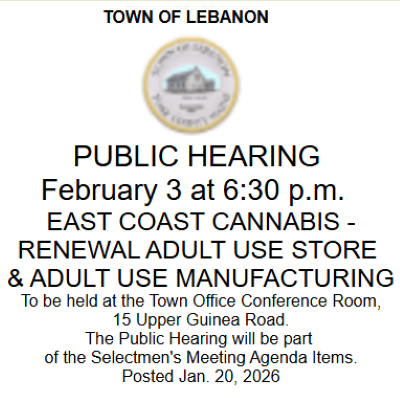
CONCORD, N.H. - The New Hampshire Section of the American Society of Civil Engineers (ASCE) today released its 2017 Report Card for New Hampshire Infrastructure, giving the state's infrastructure an overall grade of "C-."
A team of professional engineers from across New Hampshire assessed and graded 12 categories of infrastructure, including Aviation (C+), Bridges (C-), Dams (C-), Drinking Water (C-), Energy (C+), Hazardous Waste (C), Ports (D+), Rail (C-), Roads (C-), Solid Waste (C+), Stormwater (D+), and Wastewater (D+). The report was last released in 2011, and graded the state's infrastructure a "C."
"New Hampshire's infrastructure is living on borrowed time thanks to past generations' investments," said Logan Johnson, chair of the Report Card for New Hampshire's Infrastructure. "We're not investing in the maintenance and modernization our infrastructure needs to support a thriving economy, and instead we're paying the price in other ways."
Meanwhile, Milton and Lebanon have both been touched by this seeming inertia as both New Hampshire and Maine have been slogging along now for five years regarding replacement of the New Bridge Road bridge that connects both town over the Northeast Channel.
With Milton and Lebanon both trying to step up to the plate with town money, it's hoped it will be replaced fiscal year 2019-2020.
As expected, the 2017 Report Card for New Hampshire's Infrastructure finds that much of the state's infrastructure requires investment and upgrades to keep up with its needs. Of note:
- New Hampshire passed a 4.2-cent/gallon gas tax increase in 2014, which helps to offset some of the costs from 20 years of deferred investment, however there are still unmet needs. The effectiveness of a gas tax continues to decline as vehicle mileage per gallon and alternative fuel vehicles continue to erode the revenue generated.
- Airport capital investment needs for the next 20 years exceed the available funding by $100 million to $200 million.
- Nearly 80% of all state-owned bridges were built prior to 1980. As of December 2015, 12.8% of the bridges in state were considered structurally deficient.
- Dams that are not maintained in good operational order can fail and cause loss of life and economic damage. 60% of New Hampshire dams were built before modern dam safety engineering standards were developed.
- Much of the current energy infrastructure - including distribution systems, source of supply infrastructure, water treatment facilities, and pumping facilities - is in need of upgrades or replacement, with a 10-year investment need of approximately $857 million.
- The demands on municipal stormwater management continue to increase, with aging stormwater infrastructure handling greater flows than they were originally designed for.
- Wastewater infrastructure assets were not designed to serve today's population, do not meet new regulatory requirements, and are not replaced at the end of their lifespan, resulting in increased costs and rising probability of failure.
The 2011 Report Card included a grade for School infrastructure. Because of a lack of recent available data on the condition of New Hampshire public school infrastructure, this section was not included in the new Report Card.
Given these infrastructure challenges, the New Hampshire Section of the American Society of Civil Engineers urges action to raise the grades, including:
- New Hampshire citizens need to be informed and vocal about their communities' infrastructure needs.
- State lawmakers need to pursue consistent policies and funding sources to ensure sustained support for infrastructure and enable long-term planning.
- The state needs to pursue more locally-sourced funding for infrastructure, rather than relying so heavily on federal funding and financing to supplement the state's budget for infrastructure investment.
The Report Card for New Hampshire's Infrastructure was created as a public service to citizens and policymakers of the state to inform them of the infrastructure needs in their community. By using school report card letter grades, civil engineers used their expertise to condense complicated data into an easy-to-understand analysis.
ASCE State and Regional Infrastructure Report Cards are modeled after the national infrastructure grading system, which gave the United States an infrastructure grade of D+ last month.
To view the full New Hampshire report, visit http://www.infrastructurereportcard.org/new-hampshire.













